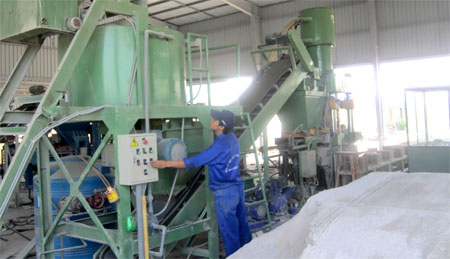
| Dual benefits from one model | |
Using modern technologies, and particularly input material waste from many other industries, the producing two-hole – cement unburned brick with hydraulic aggregate performance model in Nam Dinh Province has brought both economic and environmental efficiency for the producer – the 567 Unburned Building Materials Joint Stock Company. The performance model was implemented in the third quarter of 2012 by the Unburned Building Materials JSC (Nam Dinh City, Nam Dinh Province andcompleted in September 2013 with total investment capital in phase one of nearly VND14 billion. From the national industry promotion funding in 2013, the Industry Promotion and Consultancy Center No.1 (IPC1) provided VND227 million for the company to purchase machinery and equipment. According to Nguyen Xuan Tuyen, the Director of the 567 Unburned Building Materials JSC, cement unburned brick is a green construction technology capable of replacing backward technology used to produce traditional burned bricks. Through market research, the company decided to produce unburned bricks with two-hole bricks – cement with hydraulic aggregate technology, including domestically-made international standard pressing machinery such as mixers, hydraulic presses and automatic conveyor belts. This technology has many advantages such as high speed, safety, ease of maintenance, and simple and efficient manipulation without leak or vibration.
Talking about the advantages of cement unburned bricks, Nguyen Xuan Tuyen said they can stand under high pressed intensity, are insulating, have suitable sizes for convenient building use, are familiar to masons and are environmentally-friendly. There are many different types of unburned bricks, therefore they could be widely used from small to high-storey construction works. The technology to produce unburned bricks is also simple, mainly using waste from other industries and therefore the production costs for a this new kind of brick is minimal compared with traditional alternatives. Therefore, the unburned bricks are more preferred in the market today.
According to the estimate of the 567 Unburned Building Materials JSC, after stable operation and running at full capacity of 10 million units per year, the company could earn a revenue of VND12.6 billion per year with average profits of over VND2.25 billion per year and a capital recovery period of about five years. The model will also create 40 new jobs for local workers with average incomes of VND3 million per person per month.
The economic efficiency of the performance model is recognizable. The model also helped create many jobs for local workers, contributing to ensuring social securityand aiding economic and labor restructuring in the city.
However, according to Nguyen Toan Thang, the director of IPC1, the decisive factor that helped the technology become popular was its environmentally-friendly nature. Because input materials of the unburned brick production line mostly use waste from other industries such as coal and ore residues, wasted soil after being screened and rubble, the final products are guaranteed in terms of quality, good looking shape and environmental friendly.
Today, each year Vietnam consumes about 20 billion bricks. With this trend, the demand for bricks by 2020 will amount to over 40 billion. Therefore, it is an indispensable trend to develop the technology to produce unburned bricks. Nguyen Toan Thang added that in the coming years, the IPC 1 will continue to support involved enterprises to apply this advanced technology | |
| Vietnambreakingnews |
